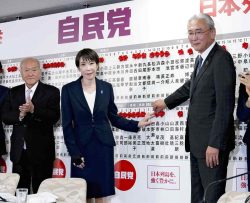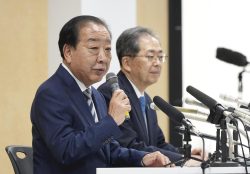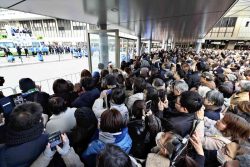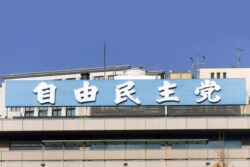Japan’s government, ruling parties hope Nago election victory will expedite air station’s relocation
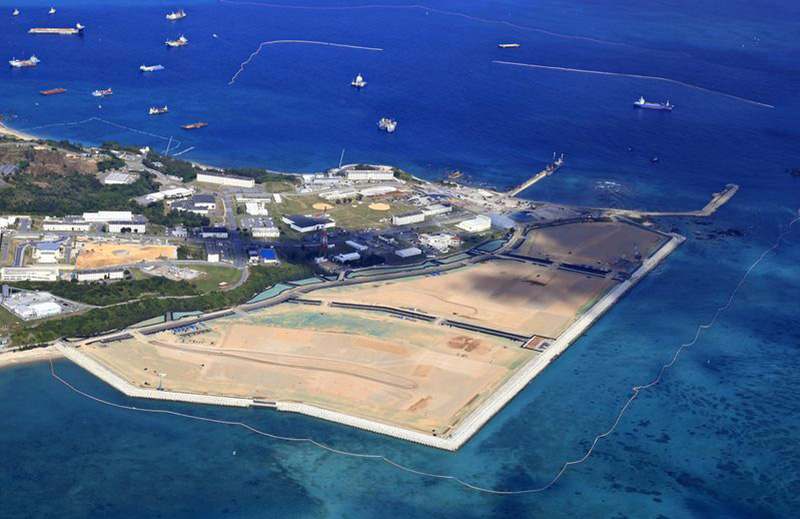
The relocation site for the U.S. Marine Corps’ Futenma Air Station in the Henoko district of Nago, Okinawa Prefecture
20:10 JST, January 24, 2022
Relief was the prevailing emotion within the government and the ruling parties as incumbent Taketoyo Toguchi was reelected mayor of Nago, Okinawa Prefecture, the city to which the functions of the U.S. Marine Corps’ Futenma air base in Ginowan are to be relocated.
Toguchi was supported by the Liberal Democratic Party and Komeito.
The government and the ruling coalition hope to accelerate the relocation work by also winning the Okinawa gubernatorial election this autumn, which is believed to be crucial for the plan to move the base’s functions. Okinawa Gov. Denny Tamaki is likely to be forced to rework his reelection strategy.
On Sunday evening, LDP Secretary General Toshimitsu Motegi made a video call to Toguchi after his victory was assured.
“The House of Councillors election is this year, and the Okinawa gubernatorial election is slated for autumn. We’ve been able to make a good start,” Motegi told Toguchi.
Afterward, Motegi told reporters, “The administration’s high approval ratings also had a positive effect.”
It was the seventh Nago mayoral election since the Japanese and U.S. governments agreed on the complete return of Futenma in 1996, and the plan emerged to relocate the functions of the air base to the Henoko district in Nago.
To move ahead smoothly with the relocation plan, the administration led by Prime Minister Fumio Kishida worked hard to get incumbent mayor Toguchi reelected. Although the LDP refrained from sending senior officials to the prefecture to support Toguchi amid the rapid spread of coronavirus infections, party leaders including Kishida and Motegi telephoned influential officials in Okinawa Prefecture day after day.
Toguchi was first elected as the mayor of Nago four years ago, beating the then incumbent, who was a leader of opposition to the relocation. The government resumed its financial support of ¥1.5 billion annually for projects related to the reorganization of U.S. forces based in the prefecture, thereby extending its full backing to the city administration led by Toguchi.
In urban districts with lots of voters, the city administration created a motorway to alleviate traffic congestion, opening it 1½ years earlier than originally planned.
In the latest election campaign, Toguchi emphasized his achievements, including the scrapping of nursery school fees, school lunch fees and medical expenses for children, which were primarily funded by the grant. He did not clarify his stance on the Henoko relocation, and also did not do so four years ago.
Former Prime Minister Yoshihide Suga has paid special attention to issues related to Okinawa since his days as chief cabinet secretary. Suga visited Okinawa last December, advising the Toguchi camp “to make the campaign a debate over financial resources.”
In his roadside speeches, Toguchi said, “Budgets can’t be secured just with idealism.”
In mid-December last year, an infection cluster of the novel coronavirus occurred at Camp Hansen, a U.S. Marine Corps base. This was the first detection in Okinawa of the omicron variant, and started with a Japanese employee working at the base.
During the election campaign, Tamaki found time in his busy schedule to visit Nago four times, repeatedly emphasizing that “the omicron variant oozed out of the U.S. base.” He tried to raise public antipathy toward U.S. bases by shifting the onus for the increase in infections in the prefecture onto the central government’s policy regarding the bases.
Concerned about the adverse impact on the mayoral election, however, the Kishida administration instructed the U.S. side to implement thorough measures to curb infections from late December. Thanks to the stronger measures taken by the United States, including restricting unnecessary outings by people related to the camp, Tamaki’s efforts proved ineffective.
The government moved ahead steadily with related work in the Henoko district even during the campaign period. In December 2018, the government began putting earth and sand into the area to be reclaimed. Along the coastal area, the sea surface has vanished in nearly 30% of the reclamation zone.
Last autumn, the government was also able to launch work related to changing the course of the Mijagawa river, an estuary of which is located on the relocation site. Based on a city ordinance, Toguchi concluded that it would not be necessary to debate the matter.
Following Toguchi’s reelection, the government will later this month get fully underway with changing the river’s course. So far, only trees on the planned site have been cut down, and work will start in March to extend the embankment — located on the north of the reclamation zone — by 190 meters.
“We’ll move ahead with whatever work we can do,” a senior official at the Defense Ministry said.
During the House of Representatives election last October, candidates who oppose the relocation shifted their emphasis to criticizing the government’s coronavirus measures. But, in the race for the Okinawa No. 3 constituency, which includes Nago, a candidate backed by Tamaki failed to garner more votes than his rival candidate running on the LDP ticket.
Those who oppose relocation lamented that they should have emphasized blocking the move. This led Tamaki to reject changes in the relocation plans, including the improvement of soft ground, thereby intensifying his opposition to the relocation.
Improving soft ground
Soft ground was discovered in a northern area of the zone that is to be reclaimed in the Henoko district, making it necessary to drive in 71,000 stakes over about 66 hectares of land. The government submitted a proposal to the Okinawa government in April 2020 to change the plans, but Okinawa Gov. Tamaki rejected it in November 2021.
The central government has taken countermeasures, including making a formal objection based on the Administrative Complaint Investigation Law. Due to the improvement work, the construction period has been extended to the mid-2030s.
Top Articles in Politics
-

Japan PM Takaichi’s Cabinet Resigns en Masse
-

Sanae Takaichi Elected 105th Prime Minister of Japan; Keeps All Cabinet Appointees from Previous Term
-

Japan’s Govt to Submit Road Map for Growth Strategy in March, PM Takaichi to Announce in Upcoming Policy Speech
-

LDP Wins Historic Landslide Victory
-

LDP Wins Landslide Victory, Secures Single-party Majority; Ruling Coalition with JIP Poised to Secure Over 300 seats (UPDATE 1)
JN ACCESS RANKING
-

Japan PM Takaichi’s Cabinet Resigns en Masse
-

Japan Institute to Use Domestic Commercial Optical Lattice Clock to Set Japan Standard Time
-

Israeli Ambassador to Japan Speaks about Japan’s Role in the Reconstruction of Gaza
-

Man Infected with Measles Reportedly Dined at Restaurant in Tokyo Station
-

Man Infected with Measles May Have Come in Contact with Many People in Tokyo, Went to Store, Restaurant Around When Symptoms Emerged


